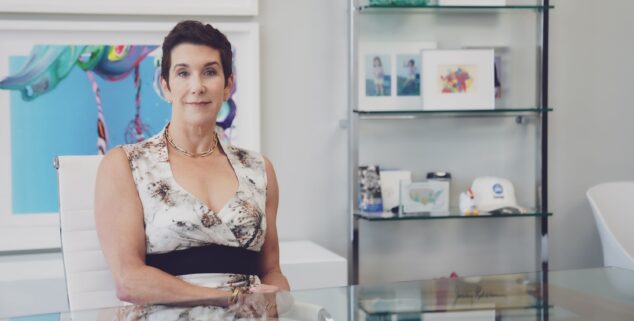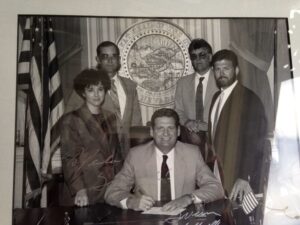News
As the legislature reaches towards gender parity, the number of female lobbyists is also growing
 Cassie Gilson, Axiom Advisors. Photo by Scott Duncan, Capitol Weekly
Cassie Gilson, Axiom Advisors. Photo by Scott Duncan, Capitol WeeklyWith the legislature on the verge of gender parity and the Capitol’s own #MeToo reckoning just a few years ago, Sacramento is rapidly becoming less of an old boys’ club.
Another area where women are making gains: among the ranks of the lobbying corps, where they’re largely driving the rise in the number of lobbyists working the Capitol.
“Women feel empowered,” said Cassie Gilson, one of the co-founders of Axiom Advisors, one of the largest lobbying firms in Sacramento.
To be clear, men still outnumber women among both contract lobbyists and in-house lobbyists registered to work in Sacramento. But a Capitol Weekly comparison of the current list of registered lobbyists on the Secretary of State’s Cal-Access platform with the list from the 2011-12 cycle (the first cycle when placement agents had to start registering as lobbyists) found that no matter how you crunch the numbers, women are gaining ground in lobbying.

Paula Treat, circa 1986 with Nevada Gov. Bob Miller
In raw numbers, the number of women registered as lobbyists has increased by about 300 during those cycles, from about 800 in 2011-12 to about 1,100 in 2023-24. That represents about a 35 percent increase in the number of women lobbyists, while the overall number of registered lobbyists increased about 20 percent during those cycle.
In other words, while the overall number of lobbyists has increased since the 2011-12 cycle, from about 2,200 to about 2,700, the number of women lobbyists in particular has grown faster.
Perhaps more importantly, the percentage of women in the lobbying corps has increased as well. In the 2011-12 cycle, about 64 percent of registered lobbyists in Sacramento were men. Today, that percentage is down to about 59 percent.
Female lobbyists attribute the changing culture of the Capitol to a number of factors: Sacramento’s own #MeToo reckoning, a shattering of the glass ceiling for women in the building, overall society changes when it comes to gender differences and women in the workplace.
Women are taking a bigger share of the lobbying pie, growing closer to gender parity in the lobbying corps overall. But they’re making the most gains among the ranks of contract lobbyists, where their numbers increased by nearly 40 percent from the 2011-12 cycle to today.
Overall, the number of female contract lobbyists has increased by about 100, from about 260 during the 2011-12 cycle to about 360 today. But that’s just part of the story.
Women are also increasingly taking leadership roles with lobbying firms, although documenting that change over time is bit complicated, as each firm is set up a bit differently.

Erin Niemela, partner, Niemela Pappas & Associates, circa 2009
What is clear is that the number of women-run, sole-practitioner firms has increased from about 55 in 2011-12 to about 70 today and that nearly half of the 100 or so largest lobbying firms this cycle have women somewhere in their leadership, be they partners or founders or principals or owners or vice presidents or presidents.
“It’s changed a lot the last 10 to 15 years,” said Paula Treat, a female pioneer of Sacramento’s lobbying corps.
There was a time when the Capitol’s female lobbyists were frozen out of meetings, literally not invited to important discussions about their clients’ bills simply because they were women. But female lobbyists tell Capitol Weekly that doesn’t happen anymore as gender parity has grown in the lobbying corps alongside that of the legislature itself and its aides.
“We still have to work harder to be seen as having as much cachet…That’s the piece we’re still working on.”
Female lobbyists attribute the changing culture of the Capitol to a number of factors: Sacramento’s own #MeToo reckoning, a shattering of the glass ceiling for women in the building, overall society changes when it comes to gender differences and women in the workplace.
But one unexpected factor that women lobbyists point to is term limits. Before term limits, entrenched male lobbyists had the upper hand over any upstart woman lobbyist, simply because they knew the men in power. But with term limits, male and female lobbyists both start with a clean slate every dozen of years or so, giving women in the lobbying corps a level playing field with their male counterparts.
Still, women lobbyists say they feel they have to worker harder to earn the respect that is often just given to male lobbyists who show up with a nice suit and smile.
Erin Niemela, a partner in Niemela Pappas & Associates, another one of the largest lobbying firms in Sacramento, said women have long worked in the building, but they were historically relegated to worker bees, responsible for the day-to-day blocking and tackling, but were often kept out of the critical and strategic roles until the last decade and a half.
“We still have to work harder to be seen as having as much cachet,” Niemela said. “That’s the piece we’re still working on.”

Soyla Fernández, Fernández Jensen Kimmelshue Government Affairs
That’s just a small example of the kind of obstacles women lobbyists still have to overcome. But those interviewed by Capitol Weekly agreed that among the worst problems female lobbyists faced – overt propositioning from male staffers or lawmakers – has largely been eliminated, though more subtle and pernicious sexual harassment and pressure is still as common in the lobbying profession as it is in other lines of work.
Women lobbyists told Capitol Weekly stories about males in and around the building trying to kiss them on the lips or relentlessly pursue them for dates. Treat recounted that when she worked in Washington, D.C. as a lobbyist in the late 1970s, the male chief of staff of a committee told her he did his business on the golf course or the mattress and asked her, “What’s it going to be?”
Treat told him she was working on her golf game and started golf lessons the next week.
Niemela, a former legislative aide, said there was a time when women in the building would regularly have to face sexual harassment. She said the culture of the building and the Capitol community in general has evolved significantly since then.
“It’s crazy to think about the stuff that used to go on,” Gilson agreed.
Soyla Fernández, the president of Fernández Jensen Kimmelshue Government Affairs, another of Sacramento’s largest lobbying firms, said she’s encouraged that in recent years the stereotype of who is a lobbyist and what they do has evolved in California. She noted that there’s not just more diversity in the lobbying ranks in terms of gender, but also age and race as well.
“Things are changing and evolving quicker than when I started,” she said.

Jennifer Fearing, Fearless Advocacy
Jennifer Fearing, the head of Fearless Advocacy and a long-time lobbyist, said she’s enjoyed recently collaborating with female lobbyists who are the top of their game. She said she found the negotiating style of her female colleagues to more cooperative and less personal, which she thought was significant, given that women are often accused of being overly emotional.
“I feel a real feminine leadership style can come to the fore,” Fearing said.
But she also said that she felt there was still more work to do. Fearing and others said they long for the day when women no longer have to fight for a seat at the table and can instead focus just doing their jobs.
“We’ve come a long way,” Niemela said, “and there’s still some more subtle things to overcome.”
Editor’s note: This story has been slightly updated from an earlier version.
Want to see more stories like this? Sign up for The Roundup, the free daily newsletter about California politics from the editors of Capitol Weekly. Stay up to date on the news you need to know.
Sign up below, then look for a confirmation email in your inbox.

Leave a Reply